Ethical Consumer Review
Studies and thinking on current ethical consumer behaviours, institutions, ideas, interventions and campaigns.
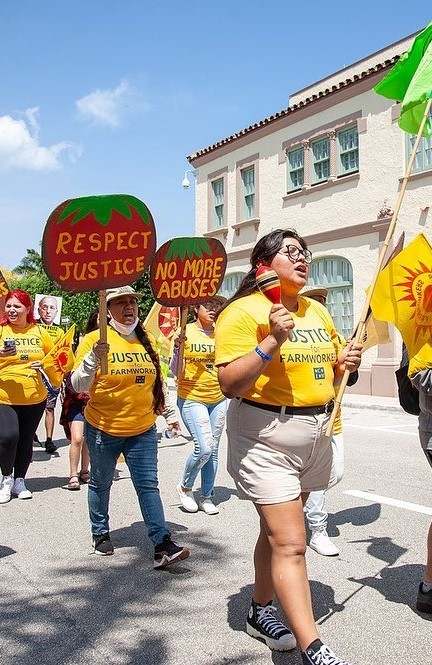
Analysis of workers’ rights initiatives in Spanish agriculture
19th September 2025
Supermarkets across Europe and the UK source fruit and vegetables from southern Spain, where workers’ rights abuses are endemic.
When supermarkets or agricultural producers are accused of being linked to labour exploitation in Spain they typically respond by highlighting the protections that are in place: for example, involvement in grievance mechanisms, certification schemes, or policies which are designed to safeguard workers’ rights.
But do any of these initiatives, from grievance mechanisms to organic certification, result in protections for workers?
We reviewed 23 different initiatives and assessed their strengths and weaknesses.
Read the article to find out more.
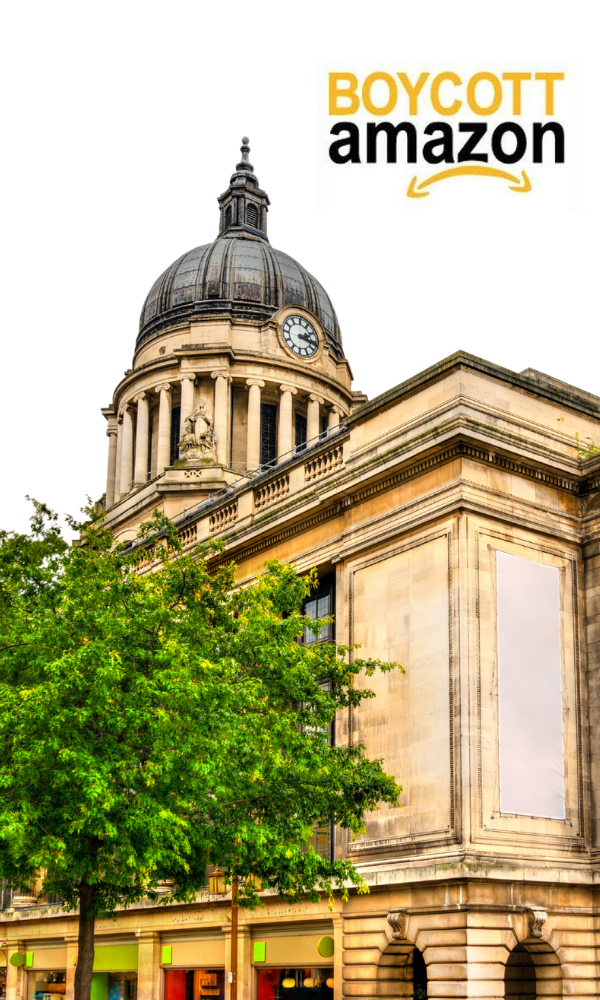
Publicly funded local authorities spend millions with tax avoider Amazon
29th May 2025
New research by Ethical Consumer has found that 74% of a sample of English local authorities have increased their spending with Amazon over the last three years.
Results from our freedom of information requests to 131 English local authorities revealed that 75% of them had Amazon business accounts.
Although the majority of the sampled authorities spend under £100,000 a year with Amazon, one spent over £1million in 2023/24.
The irony is that taxpayers money is being spent with a known tax avoider. Public services and local authority spending could benefit from the additional public money, if Amazon paid its fair share of corporate taxes.
Read our report and research findings to find out more.

UK universities spent more than £63 million with Amazon over the last three years
24th April 2025
New research by Ethical Consumer has found that 59% of UK universities have increased their spending with Amazon over the last three years.
Results from our freedom of information requests to 133 UK universities revealed that of the 92 universities that provided data, total spending with Amazon between 2022 and 2024, they spent over £63 million on Amazon services.
Spending has risen for vouchers (often used to incentivise students) and Amazon Web Services.
Given Amazon’s very poor tax record, we question if publicly funded bodies should be spending so much with Amazon.
Read on for the full research findings and to access the data.
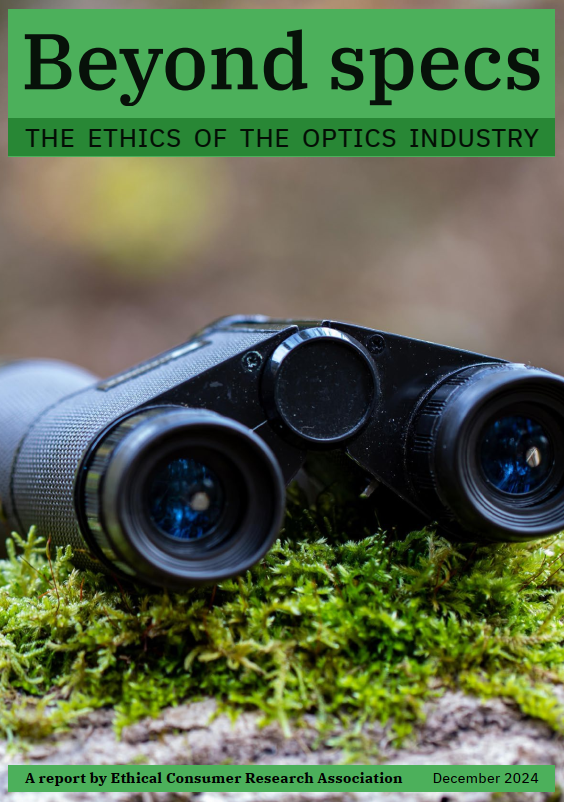
Beyond Specs: New report on the ethics of the optics industry
5th March 2025
Bird and other wildlife watching is a popular activity for many people. But wildlife enthusiasts may not be aware of the links between many brands of binoculars and other equipment, and sports hunting, arms, and military sectors
Ethical Consumer's new report, Beyond Specs: the ethics of the optics industry, investigates these links and follows on from the previous Shooting Wildlife reports (published in 2016, 2018 and 2020).
Beyond Specs examines not only the links between sport optics companies and hunting and the military, but also the wider practices of optics companies, such as their environmental and climate impacts, workers’ rights policies and practices and tax conduct.
Read a summary and access the full report in our feature article.
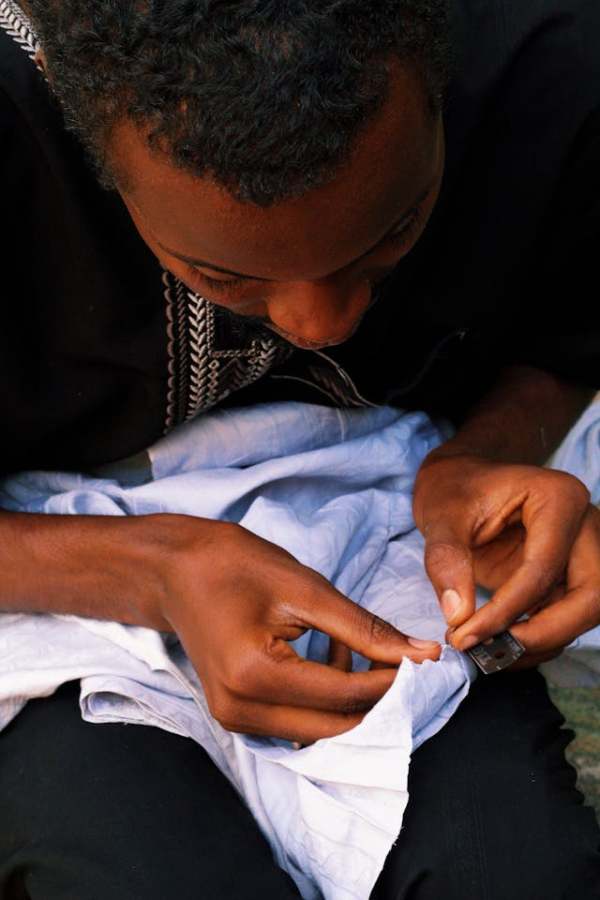
Towards a more sustainable fashion sector
14th February 2025
Ethical Consumer magazine has been producing shopping guides on clothing for many years. These have consistently shown very poor practice in all ethical categories by the mainstream brands, with little improvement despite concerted campaigning by activists and NGOs.
A new report by Ethical Consumer describes what a more sustainable clothing sector might look like and suggests five themes for potential funding which would help to move the sector in the right direction. It was commissioned by a foundation seeking to use its funding to support a more sustainable clothing and textile sector.
The report is based on evidence from NGOs, campaigners, academics and clothing-makers and will be of interest to funders working towards a more sustainable clothing sector as well as campaigners and anyone working in the textile and fashion industry.
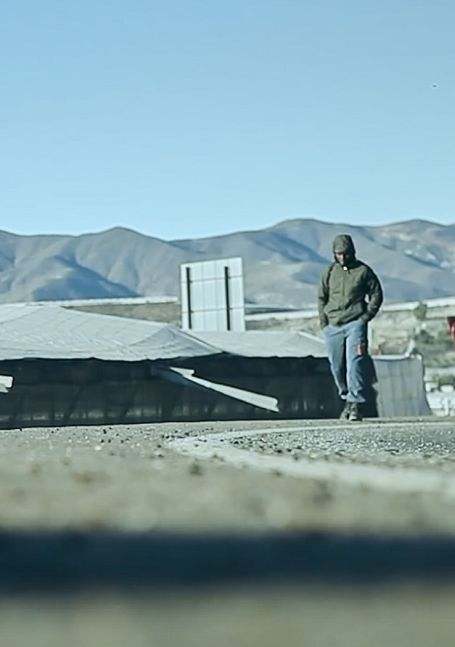
EU legislation to end forced labour in supply chains
10th September 2024
The EU has recently approved two pieces of legislation which could have a positive impact on the lives of millions of people in forced labour worldwide.
The two laws place a responsibility on businesses to address, mitigate and remediate forced labour in their value chains, or otherwise face financial consequences. Workers around the world will have improved routes to justice for the human rights abuses they experience.
But, as the UK is now outside the EU, the UK could become a hot-spot for products of forced labour and a safe haven for companies that want to side-step legal responsibility for human rights and the environment.
Sian Lea from Anti-Slavery International discusses the potential for the legislation.
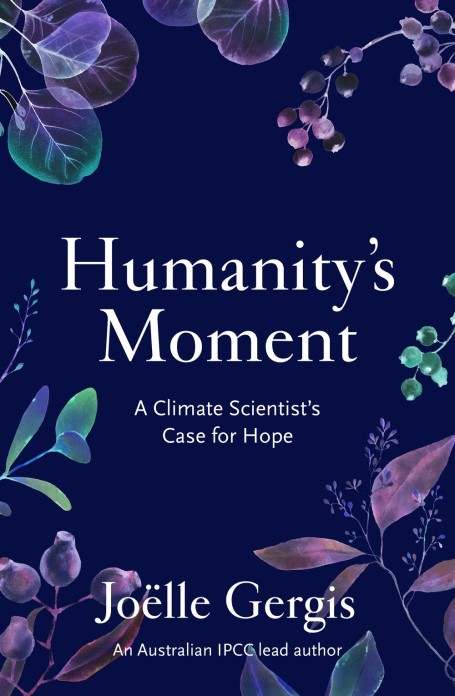
Humanity’s Moment: a case for hope?
17th January 2024
In this personal book review, Ruth Strange, a senior researcher at Ethical Consumer, shares her thoughts on the book Humanity’s Moment: A Climate Scientist’s Case for Hope by Joëlle Gergis.
Joëlle is a scientist and lead author on the IPCC report concerning global water cycle changes. The book is heartfelt and personal, and packed with brutal facts about climate change impacts that many of us may have been avoiding.
But Joëlle also talks about social tipping points, and times when the unwinnable was won. She sets out examples for hope. And what feels really useful for everyday motivation is the phrase on the cover flap: “human history is an endless tug-of-war for social justice”.
A challenging and rewarding book.
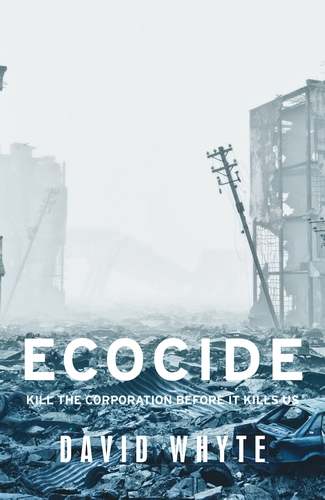
Corporate structure, ecocide, and equity fines
3rd August 2023
David Whyte’s book Ecocide, presents detailed evidence of how specific companies have knowingly destroyed ecosystems in the pursuit of financial gain.
Professor Whyte challenges the idea that all we need to fix the problems around us is just better, or more robust, regulation from governments.
He also introduces the idea of 'equity fines' as one way of making progress. If an oil company, for example, is found guilty of damaging a river, rather than issuing a monetary fine, a judge could order the company to issue new shares which could be held by the affected community.
Rob Harrison from Ethical Consumer talks to David about corporate structure, ecocide and the possibilities of new community coalitions.
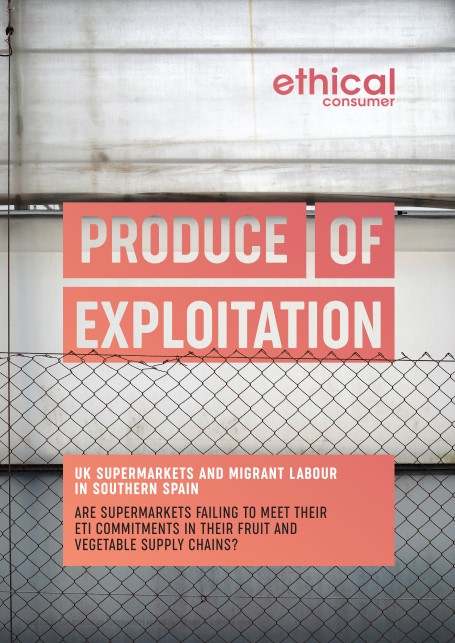
Supermarkets and migrant workers’ rights abuses in Spain
31st March 2023
A new research report from Ethical Consumer details extensive labour exploitation in the agricultural sector in southern Spain, compiling evidence from interviews with workers, and reports published by trade unions, academics, the UN and NGOs.
The regions of Huelva and Almeria export vast quantities of fresh produce, from strawberries to tomatoes, to the UK each year. Migrant workers are key to making the vast scale of production possible.
The 'Produce of Exploitation' report shows that UK supermarkets are sourcing from these regions in which labour exploitation is endemic.
The findings of the report show that UK supermarkets must take action to address abuses including forced labour, sexual harassment, and union busting in their southern Spanish supply chains.
The research is part of our campaign to support migrant workers in southern Spain. The report was peer reviewed by Anti-Slavery International

A climate ranking of 10 of the largest manufacturers of computer mice and headsets
27th January 2023
A new research report from Ethical Consumer investigates 10 companies who make computer mice and headsets, and their actions and policies on carbon.
Each company we researched received an Ethical Consumer rating of best, middle or worst for carbon management and reporting. Four companies met the criteria needed to secure a best rating, with five achieving a worst rating.
The companies investigated in this report are some of the biggest brands in the computer peripheral sector, including Dell, HP, Lenovo and Toshiba.
The research is part of our Carbon Ranking Research Project, where we investigate the steps being taken by industry to address the climate emergency.

A climate ranking of the 11 largest UK opticians chains
27th January 2023
A new research report from Ethical Consumer investigates 11 UK opticians for their actions and policies on carbon.
Each company we researched received an Ethical Consumer rating of best, middle or worst for carbon management and reporting. Only three companies in the multi-billion pound industry met the basic criteria needed to secure a middle rating. None achieved a best rating.
Although we found encouraging initiatives offering sustainable products and recycling schemes, we thought that these would have a limited impact on the industry’s carbon footprint.
The research is part of our Carbon Ranking Research Project, where we investigate the steps being taken to address the climate emergency.
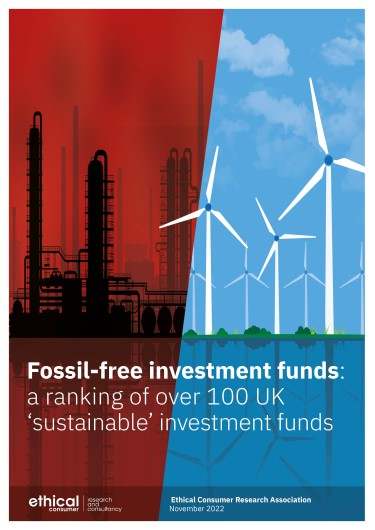
Fossil free investment funds report
28th November 2022
A new research report from Ethical Consumer ranks the climate policies and fossil-fuel divestment criteria of more than 100 ‘sustainable’ UK funds and trusts. Ethical Consumer believes that investment funds which are marketed under the banner of ‘sustainability’ should, as a minimum, avoid investing in the fossil fuel sector.
However, our research found that a significant number of 'sustainable' funds are still investing in fossil fuels.
Our five-star rating system aims to drive transparency, highlight best practice, and challenge the reliance on ‘engagement’ strategies in the UK asset management sector.
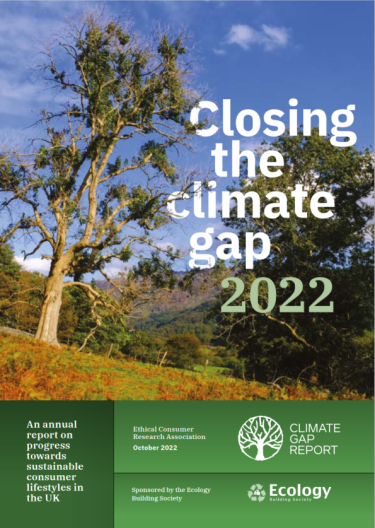
Closing the Climate Gap 2022 Report
18th October 2022
Rob Harrison and Josie Wexler introduce introduce Ethical Consumer's second annual report: Closing the Climate Gap 2022: An annual report on progress towards sustainable consumer lifestyles in the UK.
Our Climate Gap reports aim to annually track the gap between our current combined consumption emissions and where they need to be by 2030. They also aim to produce a simplified list of key actions for consumers, companies and governments, and these appear across the five report cards (summary, food, heating, transport, and consumer goods).
In this second annual report we discuss how well consumers, companies and the government have worked together to achieve these goals.
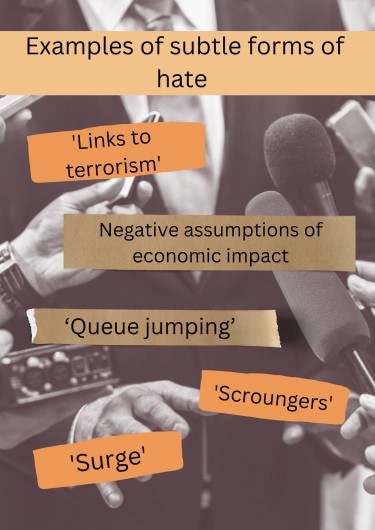
Addressing subtle forms of hate in UK media coverage of migration
4th October 2022
A new research report designed by Stop Funding Hate and Ethical Consumer has been published, to address the problem of subtle hate in UK media coverage of migration, and to explore ways of addressing it. The research sought to answer three main questions:
- What do we mean when we talk about more subtle forms of hate speech?
- How can more coded forms of anti-migrant hate be more effectively identified and tackled?
- How can societies best stand up to it and prevent it from proliferating further?
In recent years, several UK newspapers have publicly claimed to have cleaned up their act when it comes to coverage of migration. But there is concern about the prevalence of more subtle anti-migrant narratives within the UK media. One particular worry raised is that such narratives may, in some cases, have a greater impact on public perceptions than more obviously problematic headlines.
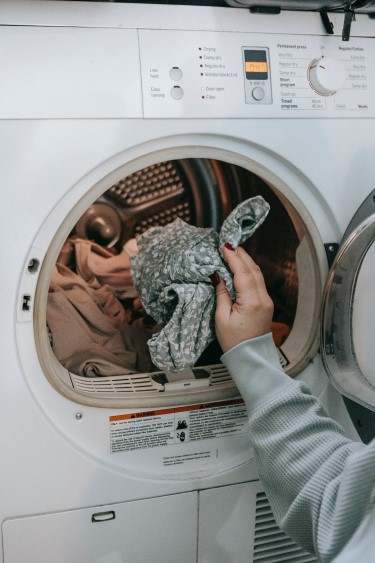
Home appliance brands and sustainability
August 2022
Marlous Veldt presents the findings from an in-depth ranking study looking at sustainability inside 44 manufacturers of fridges, washing machines, TVs and vacuum cleaners.
Our research found that of the 44 companies rated during the period from May 2020 to July 2021, 25 (57%) improved. This shows strong evidence that the direction of travel over the period was for improved engagement with sustainability issues. Most of the positive changes in scores came from companies’ improved carbon reporting.
Overall though, performance left a lot be desired. Only 13 (30%) of the 44 companies appeared to demonstrate a reasonable understanding of the sustainability issues that were relevant to them and of the need to take action with immediate effect.

Amazon earns millions from UK universities
July 2022
Edward Lander reports on the results of a Freedom of Information request made by Ethical Consumer in 2022.
Ethical Consumer sent out a Freedom of Information (FOI) request to 134 UK universities in February 2022 to find out how much the UK higher education sector has spent on Amazon in recent years. 93 universities replied with data.
Our calculations show that higher education has become more reliant on Amazon in the past three years, with 63% of universities increasing their purchasing with the company. The research found that the average annual Amazon spend for UK universities reached £151,728.93 in 2021.
We have calculated that Amazon secured more than £20 million of income from UK universities in that year. This is despite Ethical Consumer's own figures showing that Amazon's aggressive tax avoidance practices could be depriving the UK exchequer of around £500 million.
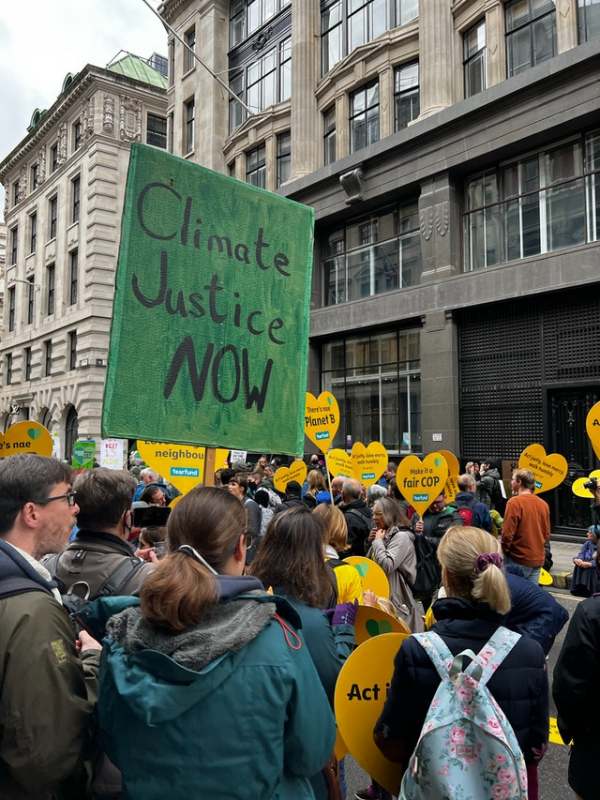
Ethical buying by local authorities
January 2022
Buying ethically is not something that just individuals do. We can also see it happening in clubs, societies, businesses, charities, local authorities and governments. In this second extract from the 'Handbook of Ethical Purchasing', Rob Harrison introduces the five types we tend to see in local governments around the world.
These are: solidarity purchasing, buying locally or for local economic impact, sustainable procurement, social procurement, and attention to investments and assets.
It is estimated that public sector purchasing represents between 11% and 18% of the UK’s gross domestic product and is similar in other countries. There is therefore real potential to improve people’s lives if this kind of ethical purchasing were more widely adopted.

Locked down, locked in and locked out: The forbidden fruits of female labour
December 2021
This essay explores the role of gender in the exploitation of agricultural workers in Southern Spain.
Huelva, a province in southern Spain, is the country's top agricultural province, part of a globalized agri-food chain managed by multinationals and commercial distributors (Women’s Link International, 2019). Strawberries are so valuable to the economy of this area that they are nicknamed ‘Spain’s red gold’.
In order to meet high demand for exported fruit while maintaining high profit margins, after the drop in seasonal migrants due to EU migration policies, the farming industry began advertising for seasonal workers in their countries of origin (notably in Morocco and Eastern Europe), and almost exclusively recruited women.
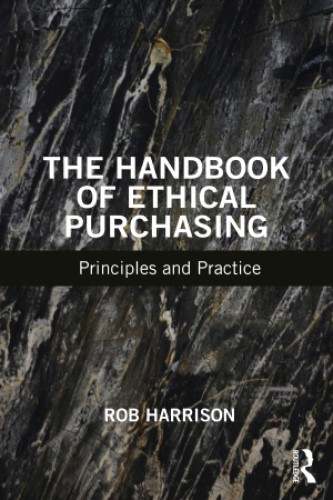
The Handbook of Ethical Purchasing - new book
October 2021
In October 2021, a new book was launched by Rob Harrison, one of the original founders of Ethical Consumer.
The Handbook of Ethical Purchasing is designed to help both ordinary people and industry professionals to understand the movement towards ethical buying, its political background and, most importantly, how to become involved more effectively.
This article explains more about the book, and then shares the first of a series of extracts which appeared in issue 193 Ethical Consumer magazine. The extract discusses the notion of purchaser power, and uses a couple of historic boycott campaigns by way of example. These include the Alabama Bus boycotts of the 1960 and the Shell boycott of 1995.
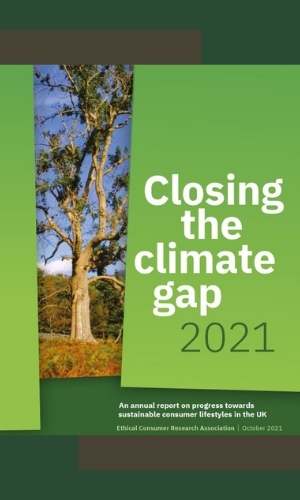
Climate Gap Report 2021 - Our new report looks at the gap between our current combined consumption emissions and where they need to be by 2030.
October 2021
It is widely recognised that the next ten years will be critical in turning around global carbon emissions. As one of Ethical Consumer’s contributions to this process, we plan to produce an ‘Annual Climate Gap Report on Progress Towards Sustainable Consumer Lifestyles in the UK’.
The 2021 report, launched during Ethical Consumer Week on October 19th, will be the first in a series.
It aims to track the gap between our current combined consumption emissions and where they need to be by 2030.
The Climate Change Committee (CCC) was set up under the Climate Change Act 2008 to advise the UK government on decarbonisation. The CCC’s 200-page reports have provided most of the data for three of the impact areas we are examining for this Report: Food, Transport and Heating. A core element in this project is therefore trying to convert the CCC’s work into something more digestible for ordinary consumers. For the fourth impact area, Consumer Goods, we have conducted our own research and extrapolated targets and campaigns from elsewhere.
A key goal is to produce a simplified list of key actions for consumers, companies and governments too.
The 2021 has 5 key findings - read on to find out more.

UK Coffee shops fail to convince on climate change - A report on carbon management and reporting at nine UK coffee shop chains.
May 2020
As public awareness of climate change has increased, some coffee shop chains have been forced to acknowledge consumer demand for more sustainable products and services. This has led to shift towards a ‘greener’ image for many brands, often characterised by reusable cups and plastic alternatives which, in the grand scheme of things, do little towards reducing greenhouse gas emissions.
We set out to find out what some of the UK's Coffee chains were doing to address and reduce their greenhouse gas emissions. Each company researched received an Ethical Consumer rating of best, middle or worst for carbon management and reporting.
Our rating results show a need to seriously question why some of the UKs biggest coffee chains are failing in the carbon reduction department.
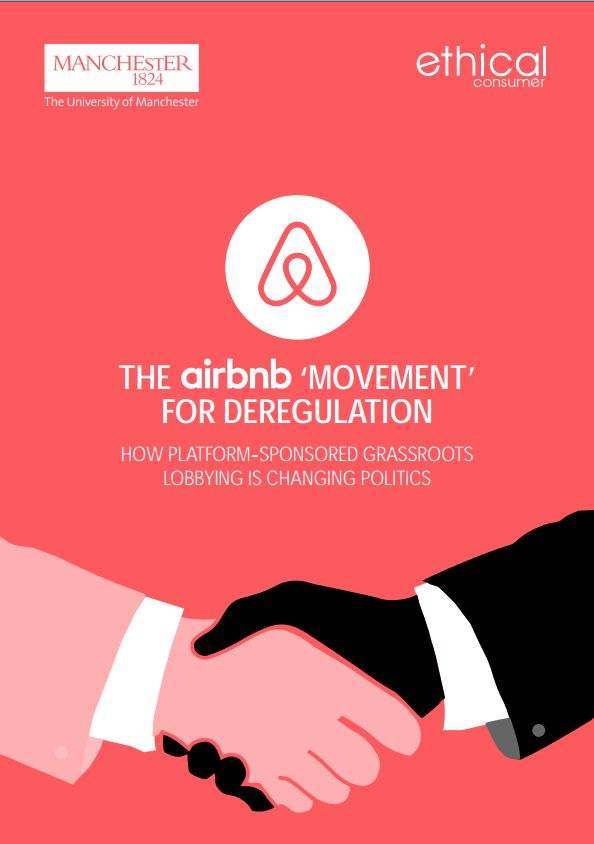
The airbnb 'movement' for deregulation
This report is about the ethics and transparency of corporate political organising. Its case study is Airbnb, one of the biggest companies in the ‘platform’ economy, who resources, mobilises and coordinates its landlords as political advocates to lobby for its preferred forms of regulation.
Airbnb presents carefully curated and intensively coordinated groups of landlords with a single room or property as ‘people power’: independent grassroots groups who share its policy preferences. This offers the company legitimacy and additional political influence to protect a business model that is increasingly dominated by professional accommodation providers.
The report examines Airbnb’s ‘home-sharing clubs’: associations of selected Airbnb landlords that are trained to advocate for favourable regulation. It analyses documents and interviews twenty-one former Airbnb public policy staff who worked across fourteen countries in North America and Europe, in the most intensive and sustained platform-sponsored grassroots lobbying strategy in the world to date.
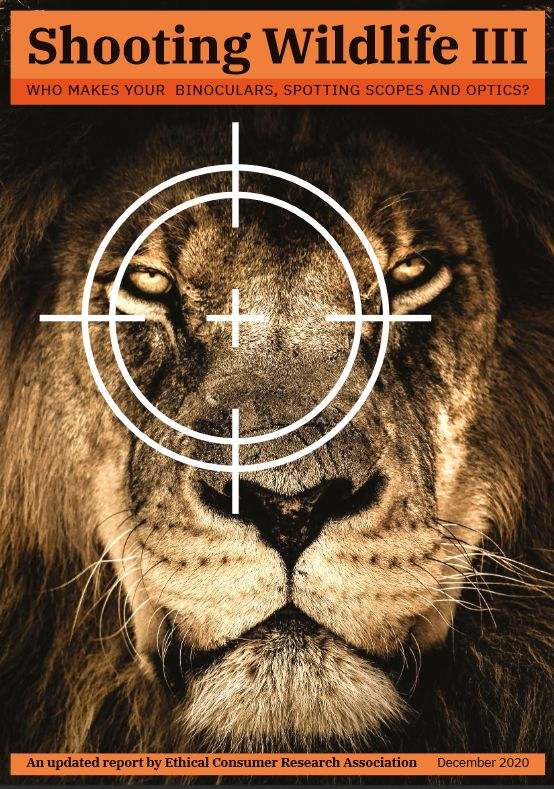
Shooting Wildlife III
This report explores the debates surrounding the ethics and impacts of sport hunting and updates the 2016 and 2018 ‘Shooting Wildlife?’ reports – examining how 30 optics companies approach this sensitive subject.
It also expands on the scope of the first two Shooting Wildlife reports to explore optics companies’ links with the military (due to this industry’s large impact on the environment and therefore wildlife), and their approaches to managing their own environment and climate impacts in line with international agreements such as the Paris Agreement on climate change.
As part of the research, we contacted all 30 optics companies featured in the 2018 report, asking for thoughts on the issues raised and requesting information about current environment and climate policies and changes to company policy and practice since 2018. 29 companies are reviewed in this report as the Alpen brand is now distributed by Bresser USA and is therefore included in Bresser’s profile in this report.
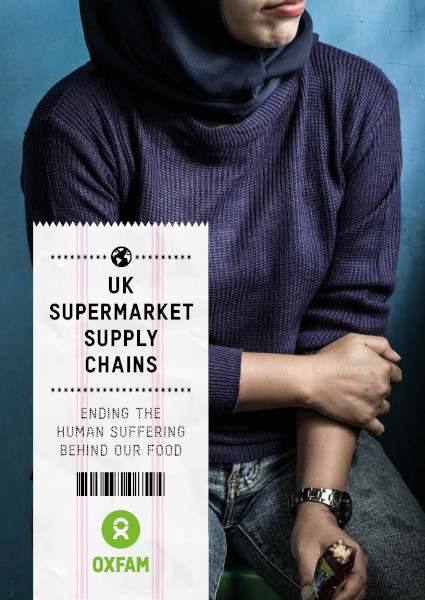
Oxfam’s Behind the Barcodes Campaign
A review of Oxfam's current campaign to ‘end human suffering in supermarket supply chains’. Rob Harrison (October 2019)
In June 2018 Oxfam International launched a new global campaign to ‘end human suffering in supermarket supply chains’. Part of this campaign involves producing an annual ranking of major food retailers like Tesco and Walmart against four key social benchmarks, and calling on consumers to contact them using social media to ask them to improve their performance. The first annual update was published in July 2019.
This article explains what the campaign is, explores Oxfam Great Britain’s (GB’s) role in it, and looks at what it might be able to do to increase its impact. It also looks at the campaign against the wider backdrop of large NGOs becoming attracted to the use of ranking corporates as a way of driving social progress…or at least as a way of preventing further social decline.

Living the Good Life on Instagram
An exploration of lay understandings of what it means to live well. Anastasia Loukianov (August 2019)
While the consumerist approach to what living well can mean permeates traditional media, the extent to which it appears in people’s own depictions of the good life is unclear. As the unsustainability of the consumerist approach is increasingly evidenced, both in terms of environmental and social impacts, looking into which understandings of the good life resonate with people becomes essential.
This article uses a sample of posts tagged #goodlife and variants originally collected in 2014-2015 on Instagram (a popular image sharing platform) to explore which understandings of the good life can be found on the platform.
More from the Ethical Consumer Review